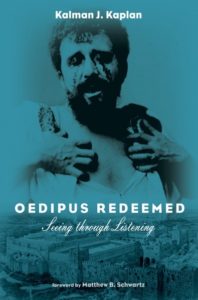WIPF AND STOCK (2019)
https://wipfandstock.com/oedipus-redeemed.html
by Kalman J., Kaplan (Author) and Matthew B. Schwartz (Foreward)
ISBN: 978-1-5326-7194-4

About the Book:
An initial play, Oedipus in Jerusalem, related the narrative of Nathan, the biblical prophet, encountering the blinded Oedipus wandering alone outside of Thebes. Nathan brings him to Jerusalem to be tried at the Jewish Sanhedrin. The Greek playwright Sophocles is the prosecutor, and Nathan serves as the defense attorney. Oedipus is acquitted, but he refuses to accept his acquittal, shouting, “I am guilty! I am guilty of patricide and incest.”Oedipus Redeemed focuses on Nathan and Sophocles combining forces to present Oedipus with two dialogues of historical/biblical characters within the play. The first contrasts the suicide of the Greek Zeno the Stoic after a minor mishap with the life affirmation expressed by the biblical Job after monumental losses. This is designed to uncover the possibility that Oedipus is experiencing shame rather than guilt (after all, he did not commit suicide until after he blinded himself). Nathan and Sophocles focus on the secondary psychological benefit Oedipus has received from insisting on his guilt, and on his coming to terms with the fact that he had blinded himself needlessly if he was innocent. The second dialogue between the biblical prophetess Judith and the blind Greek seer Teiresias focuses on the biblical story of Samson being betrayed by “following his eyes.” Insight is contrasted with sight. Oedipus’s surviving daughter Ismene reunites with Oedipus, telling him she loves and needs him. The play ends with Oedipus’s return to the Sanhedrin, tentatively and tearfully accepting his acquittal.
About the Authors
Kalman J. Kaplan, PhD, is Professor in the Department of Psychiatry of the University of Illinois College of Medicine, Adjunct Professor at Spertus Institute of Jewish Learning and Leadership, USA, and Fellow in the American Psychological Association. He was awarded a start-up grant from The John Templeton Foundation and a Fulbright International Fellowship to develop an online program in Religion, Spirituality and Mental Health in America and Israel. His publications include TILT: Teaching Individuals to Live Together (1998); Living with Schizophrenia (1997); Living Biblically: Ten Guides for Fulfilment and Happiness (2012); In the Beginning: Biblical Sparks for a Child’s Week (2013); Oedipus in Jerusalem (2015); Biblical Psychotherapy: Reclaiming Scriptural Narratives for Positive Psychology and Suicide Prevention (2017); and Oedipus Redeemed (2019), among others.
Foreword by
Matthew B. Schwartz, PhD, specializes in Greek and Roman civilizations and biblical-rabbinic thought at Wayne State University, USA and at Lawrence Technological University, USA. His publications with Dr Kaplan include The Family: Biblical and Psychological Foundations (1984); Jewish Approaches to Suicide, Martyrdom and Euthanasia (1998); Biblical Stories for Psychotherapy and Counselling (2004); The Fruit of Her Hands: A Psychology of Biblical Woman (2007); A Psychology of Hope: A Biblical Response to Tragedy and Suicide (2008); and Politics in the Hebrew Bible: God, Man and Government (2013), among others.